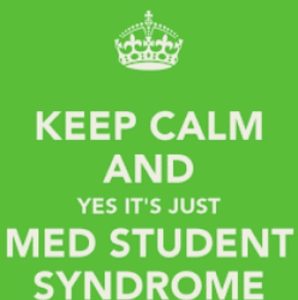By Mutalib Jibril

Medical Students’ Syndrome is also known as Medical Students’ Disease or Second Year Syndrome. This is a psychological condition among medical students who often experience the symptoms of the disease or diseases they are studying.
They feel they have developed and often have symptoms of the conditions they have been studying. For example, some may feel that a simple headache could be a warning sign for a brain tumor, or that an anxiety attack is actually an adrenal gland tumor. Lol.
Or you wake up with a headache, your neck is a bit stiff, and probably muscle aches too. Then you had a lecture about meningitis that same day. Haven heard about symptoms of meningitis in the lecture such as headache, stiff neck, nausea, high temperature, etc, there’d always be this niggling feeling.
You tend to dismiss it at first, then the lecturer might go further to list other symptoms you probably think you’re experiencing. Before you know it, you’re probably worried about meningitis when perhaps it might be due to the stress you passed through a day before.
This is normal in most cases because as you study symptoms, you think about them in relation to yourself, your family members, mates in hostels, and everyone around you. This is when classmates start sharing “haha” moments about conditions that affect some people they know.
You’ll start hearing “So that my uncle is actually suffering from cystic fibrosis”, “no wonder, that guy is having cirrhosis”, or “That man has glomerulonephritis”. etc
It is always a fast mental conclusion to relate what you’re studying with someone you know or yourself in particular.
However, while we know there’s medical students’ syndrome, it’s always better to play safe than regret it later. It’s advisable to always go to the right quarters anytime you feel worried about how you feel. It’s not every time that symptom(s) you’re experiencing as a medical student are due to Medical student’ syndrome. Some might be that you’re actually having the disease in an actual sense. It’s better to always play safe.
